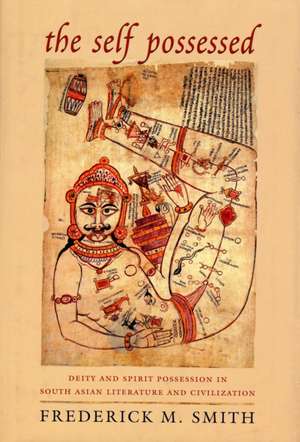The Self Possessed – Deity and Spirit Possession in South Asian Literature and Civilization
Autor Frederick Smithen Limba Engleză Hardback – 4 ian 2007
In South Asia possession has always been broader and more diverse than in the West, where it has been almost entirely characterized as "demonic." At best, spirit possession has been regarded as a medically treatable psychological ailment and at worst, as a condition that requires exorcism or punishment. In South (and East) Asia, ecstatic or oracular possession has been widely practiced throughout history, occupying a position of respect in early and recent Hinduism and in certain forms of Buddhism.
Smith analyzes Indic literature from all ages-the earliest Vedic texts; the Mahabharata; Buddhist, Jain, Yogic, Ayurvedic, and Tantric texts; Hindu devotional literature; Sanskrit drama and narrative literature; and more than a hundred ethnographies. He identifies several forms of possession, including festival, initiatory, oracular, and devotional, and demonstrates their multivocality within a wide range of sects and religious identities.
Possession is common among both men and women and is practiced by members of all social and caste strata. Smith theorizes on notions of embodiment, disembodiment, selfhood, personal identity, and other key issues through the prism of possession, redefining the relationship between Sanskritic and vernacular culture and between elite and popular religion. Smith's study is also comparative, introducing considerable material from Tibet, classical China, modern America, and elsewhere.
Brilliant and persuasive, The Self Possessed provides careful new translations of rare material and is the most comprehensive study in any language on this subject.
Preț: 523.29 lei
Preț vechi: 679.60 lei
-23% Nou
Puncte Express: 785
Preț estimativ în valută:
100.13€ • 109.11$ • 84.38£
100.13€ • 109.11$ • 84.38£
Carte tipărită la comandă
Livrare economică 23 aprilie-07 mai
Preluare comenzi: 021 569.72.76
Specificații
ISBN-13: 9780231137485
ISBN-10: 0231137486
Pagini: 832
Dimensiuni: 160 x 237 x 53 mm
Greutate: 1.11 kg
Editura: Columbia University Press
Locul publicării:United States
ISBN-10: 0231137486
Pagini: 832
Dimensiuni: 160 x 237 x 53 mm
Greutate: 1.11 kg
Editura: Columbia University Press
Locul publicării:United States
Notă biografică
Frederick M. Smith studied Sanskrit for more than a decade in Pune, Madras, and elsewhere in India, and earned his Ph.D. from the University of Pennsylvania. He is known for his work on Vedic ritual and the early sixteenth-century philosopher Vallabhacarya, whose work he has been translating. With his work on deity and spirit possession, his interest in Indian religious and spiritual experience has assumed a unique form. He teaches at the University of Iowa.
Cuprins
List of Illustrations
Preface
Acknowledgments
Introduction
Part I: Orthodoxies, Madness, and Method
1. Academic and Brahmanical Orthodoxies
Part II: Ethnography, Modernity, and the Languages of Possession
2. New and Inherited Paradigms: Methodologies for the Study of Possession
3. Possession, Trance Channeling, and Modernity
4. Notes on Regional Languages and Models of Possession
Part III. Classical Literature
5. The Vedas and Upanisads
6. Friendly Acquisitions, Hostile Takeovers, The Panorama of Possession in the Sanskrit Epics
7. Enlightenment and the Classical Culture of Possession
8. Vampires, Prostitutes, and Poets: Narrativity and the Aesthetics of Possession
9. Devotion as Possession
10. Possession in Tantra: Constructed Bodies and Empowerment
11. Tantra and the Diaspora of Childhood Possession
12. The Medicalization of Possession in ¿yurveda and Tantra
13. Conclusions: Identity Among the Possessed and Dispossessed
Bibliography
Index
Preface
Acknowledgments
Introduction
Part I: Orthodoxies, Madness, and Method
1. Academic and Brahmanical Orthodoxies
Part II: Ethnography, Modernity, and the Languages of Possession
2. New and Inherited Paradigms: Methodologies for the Study of Possession
3. Possession, Trance Channeling, and Modernity
4. Notes on Regional Languages and Models of Possession
Part III. Classical Literature
5. The Vedas and Upanisads
6. Friendly Acquisitions, Hostile Takeovers, The Panorama of Possession in the Sanskrit Epics
7. Enlightenment and the Classical Culture of Possession
8. Vampires, Prostitutes, and Poets: Narrativity and the Aesthetics of Possession
9. Devotion as Possession
10. Possession in Tantra: Constructed Bodies and Empowerment
11. Tantra and the Diaspora of Childhood Possession
12. The Medicalization of Possession in ¿yurveda and Tantra
13. Conclusions: Identity Among the Possessed and Dispossessed
Bibliography
Index
